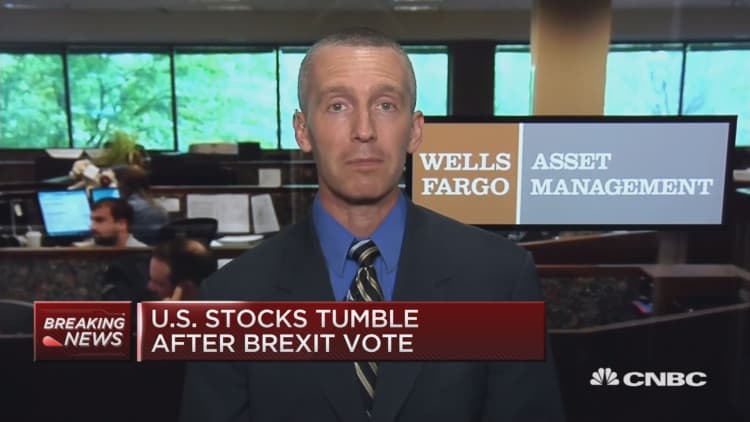
Energy companies could be most exposed to the effects of a Brexit, according to Brian Jacobsen, chief portfolio strategist at Wells Fargo Funds Management.
Jacobsen's comments came after a day of trading that saw global markets tumble in the aftermath of Thursday's U.K. referendum, which resulted in a decision for the country to exit the EU and threw economies across the world into a period of uncertainty.
Along with cautioning the "inordinate exposure" of energy companies to the U.K., Jacobsen said he would not advise investors to seek the safety of bonds given their extremely low rates.
"It would actually be a little more prudent to look at investment-grade U.S. debt," Jacobsen said on a CNBC special report Friday evening. "We could actually see yields rebound from here, unless of course something else comes out of the blue."
The government bonds of Japan, the U.S., U.K. and Germany all fell Thursday as the market became concerned that a Brexit could occur. German and Japanese government bonds both currently have negative yields, and U.S. Treasurys fell sharply after the U.K. voted to leave, before rebounding slightly during Friday's trading.
Another effect from the Brexit was an anticipated chilling for The Fed's rate hike schedule. There's now almost no chance of a rate hike at the July Federal Open Market Committee meeting, according to the CME's Fed Fund Futures tracker.
Given the stunting effect a rate hike could have on the economy, Jacobsen said it was almost ideal for upcoming jobs reports not to be too positive, calling it a "bit of a double-edged sword."
"In a way, you almost want to see decent job gains but nothing spectacular," Jacobsen said, because high jobs growth could spur The Fed to raise its rate.
— CNBC's Jeff Cox contributed reporting.

